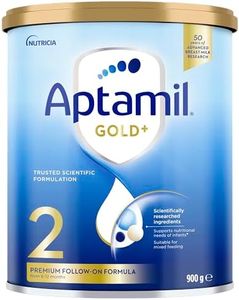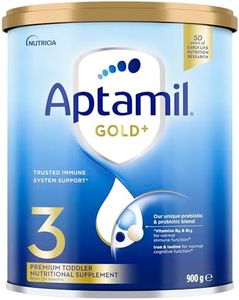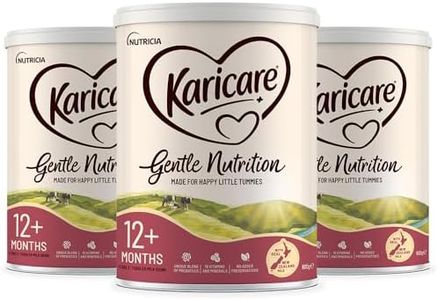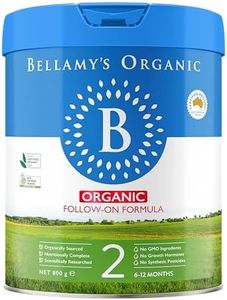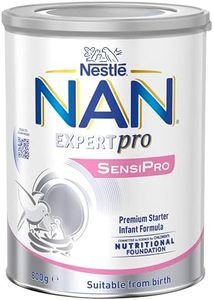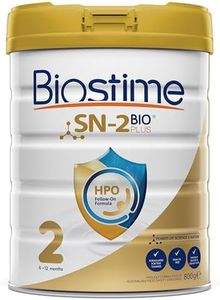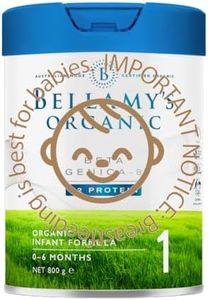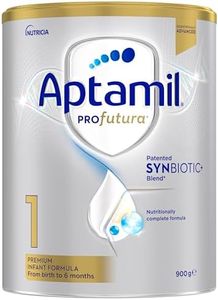We Use CookiesWe use cookies to enhance the security, performance,
functionality and for analytical and promotional activities. By continuing to browse this site you
are agreeing to our privacy policy
10 Best Baby Formulas
From leading brands and best sellers available on the web.By clicking on a link to a third party's website, log data is shared with that third party.
Buying Guide for the Best Baby Formulas
Choosing the right baby formula is an important decision, as it's often your baby's primary source of nutrition during their early months. Because babies have unique nutritional needs, digestive systems, and possible sensitivities, not every formula is the same. It is essential to match the formula to your baby's health, preference, and tolerances, while also understanding the key specifications that manufacturers use to describe their products. Learning about these key features will help you make a safe, nourishing, and comfortable choice for your child.Type of Formula (Cow's milk-based, Soy-based, Hydrolyzed, Specialized)The type of formula refers to the main ingredients and how they are processed. Cow's milk-based formula is most common and suits most infants, while soy-based is used for babies with lactose intolerance or certain dietary restrictions. Hydrolyzed formulas have proteins broken down for easier digestion, suitable for babies with milk protein allergies. Specialized formulas address specific health needs like preemies or metabolic conditions. Understanding the type helps you select a formula that matches your baby's dietary needs; often, this decision is guided by your pediatrician, especially if special considerations are required.
Form (Powder, Liquid Concentrate, Ready-to-Feed)Form simply means how the formula is prepared and stored. Powder is mixed with water and is the most common and longest-lasting. Liquid concentrate requires mixing with water and is convenient but heavier to store. Ready-to-feed needs no mixing, offering ultimate convenience at a higher cost and shorter shelf life. Your lifestyle, need for convenience, storage, and travel considerations will guide which form is best for you.
Iron ContentIron is essential for a baby's growth and brain development. Most formulas are 'iron-fortified,' which is recommended unless your doctor says otherwise. Low-iron formulas are rarely recommended. Choosing an iron-fortified formula is typically safest unless your baby's doctor advises otherwise, since iron prevents deficiencies that can cause serious health issues.
Added Ingredients (DHA, ARA, Prebiotics, Probiotics)Many formulas supplement the basics with ingredients like DHA and ARA (for brain and eye development), prebiotics and probiotics (for digestion), and nucleotides (for immune support). While these are often beneficial, the science is still ongoing. If your baby has a sensitive tummy or allergies, you may need to experiment or consult your doctor regarding added ingredients. Choose formulas with these additives if you are interested in supporting these specific aspects of your baby's development, but remember the basics are always met with standard infant formulas.
Lactose ContentLactose is the natural sugar found in milk. Some formulas are lactose-free or reduced-lactose for babies with lactose intolerance or sensitive digestive systems. For most infants, regular lactose-containing formulas are fine. If your baby shows signs like excessive gas, diarrhea, or fussiness, your doctor may suggest trying reduced-lactose choices.
Allergen InformationSome babies can be sensitive or allergic to cow's milk protein or other ingredients. Formulas are labeled to indicate if they are hypoallergenic or suitable for allergies. If you have a family history of allergies or your baby shows allergy symptoms, hypoallergenic formulas or specialized products can be recommended. Watching your baby's reactions is important in this case.


